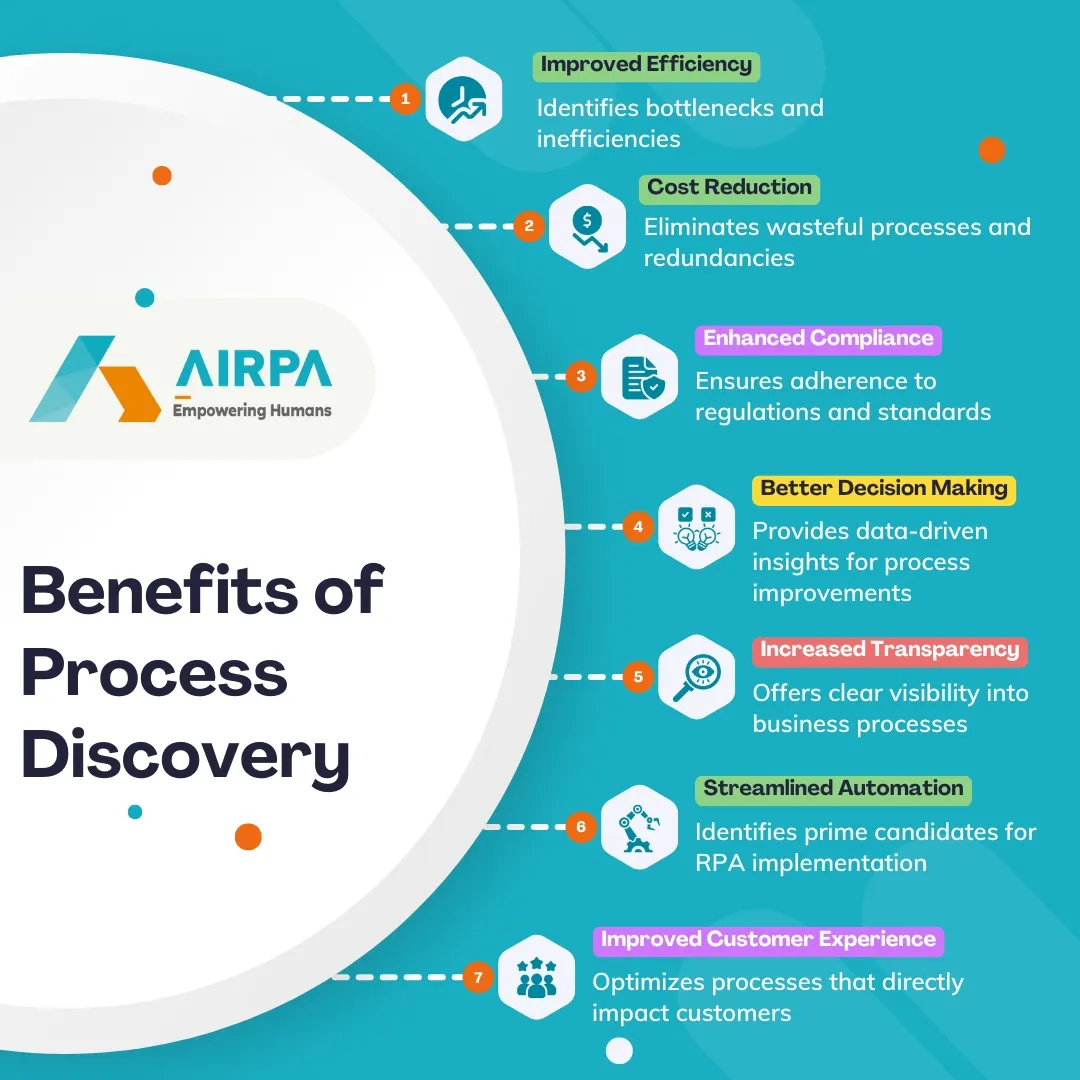
From Process to Automation: The Vital Link Between Process Discovery and RPA Success

Table of Contents
Many activities in the modern workplace are ripe for automation—with hundreds of processes to choose, many businesses face the difficulty of determining which ones would gain the most from automation. As organizations embrace robotic process automation (RPA) and AI to meet higher customer expectations, work more efficiently, and provide a better employee experience, process discovery is increasingly important in delivering on RPA's promise.
Talk to Our Automation Expert!
+91 855-975-9735
Want to experience Intelligent Automation in Action or Need help Building the Right Automation Plan?
Quite simply, process discovery is the process by which businesses learn how to carry out any business process. They can then identify and prioritize which procedures should be improved or, in many cases, automated. Some processes, such as those that are repeatable, definable, and rule-based, lend themselves better to automation than others.
What is Process Discovery?
There are probably numerous processes working simultaneously within an organization – each following a unique and distinct roadmap. To bring certain key areas under direct automation, organizations are faced with the challenge of narrowing down those processes for which automation will deliver the most significant benefit.
Business Process Discovery is the medium that helps organizations discover how every process within the company is executed and which processes most priority improvements and automation.
Process Discovery tools are incorporated to identify the most recurring and repetitive tasks that are error-prone, time, cost, and labor intensive. By transitioning such processes to automation using RPA bots, companies can meet heightened customer expectations and deliver better employee experiences.
How does Process Discovery work?
Organizations leverage automated tools and methods to facilitate Business Process Discovery. These solutions deploy bots that unobtrusively monitor the organization's workflows over a defined period. Operating silently in the background, the bots collect valuable data and record the step-by-step processes employees use to complete their tasks, without disrupting daily operations.
The bots meticulously log the various applications and systems employees interact with to carry out specific activities. Advanced AI and ML algorithms then analyze this comprehensive data, identifying the workflows that are best suited for automation. This allows the organization to pinpoint the processes that can be seamlessly transitioned to Robotic Process Automation (RPA) tools for increased efficiency and productivity.
By employing these automated Process Discovery techniques, businesses can gain a deep, data-driven understanding of their existing workflows, setting the stage for successful RPA implementation and end-to-end business process automation.
Benefits of Process Discovery
Identifying and prioritizing processes for automation are among the challenges while implementing RPA; process discovery comes to the rescue and serves as a critical precursor to successful RPA.
Process discovery enables organizations to.

- Reduce costs by decreasing variations and errors that cause additional costs and rework.
- Identify processes that can be automated to boost bottom line.
- Automate processes without guesswork by identifying, mapping, and developing workflows. This increases quality and performance while eliminating human bias.
- Identify hidden process sequences or variants.
- Improve visibility of ownership for certain process stages.
- Maximize ROI using robotic process automation, including the ability to increase productivity (robots can operate four to five times quicker than people and 24/7).
- Robotic process automation (RPA) can improve compliance by detecting non-compliant exchanges and prompting action.
- Boost employee engagement by allowing them to focus on higher-value tasks instead of repetitive ones.
- Robots can perform tasks equivalent to people, reducing costs
- Scale automation based on the amount of tasks needed for a specific goal.
How does Process Discovery affect RPA success?
Repetitive, rule-based workflows are ubiquitous within organizations, often involving numerous manual touch points and consuming significant productive hours. These monotonous tasks, while integral to business systems and processes, provide little value to employee growth and development.
To expedite such time-intensive activities, companies are increasingly deploying Robotic Process Automation (RPA) bots. However, the success of these RPA initiatives hinges on accurately identifying the right processes to automate. Failing to conduct thorough Process Discovery runs the risk of selecting the wrong processes for automation, leading to RPA failure.
Let’s Sum Up!
Intelligent Process Discovery is the crucial first step towards maximizing the return on investment (ROI) from RPA. By unlocking the true potential of RPA, Process Discovery ensures that automation is deployed within the most fitting processes and workflows. In this way, Process Discovery lays the foundation for achieving end-to-end business process automation.
If you’d like to get started with intelligent automation for your enterprise, have a closer look at the AIRPA’s automation service. It provides the tools for end-to-end business processes automation, including process discovery tools, for both enterprises and smaller businesses.
Popular Tags:
Related Articles

How Automation and AI are Reshaping the Fintech Landscape
Is AI the driving force behind fintech's rapid evolution?





